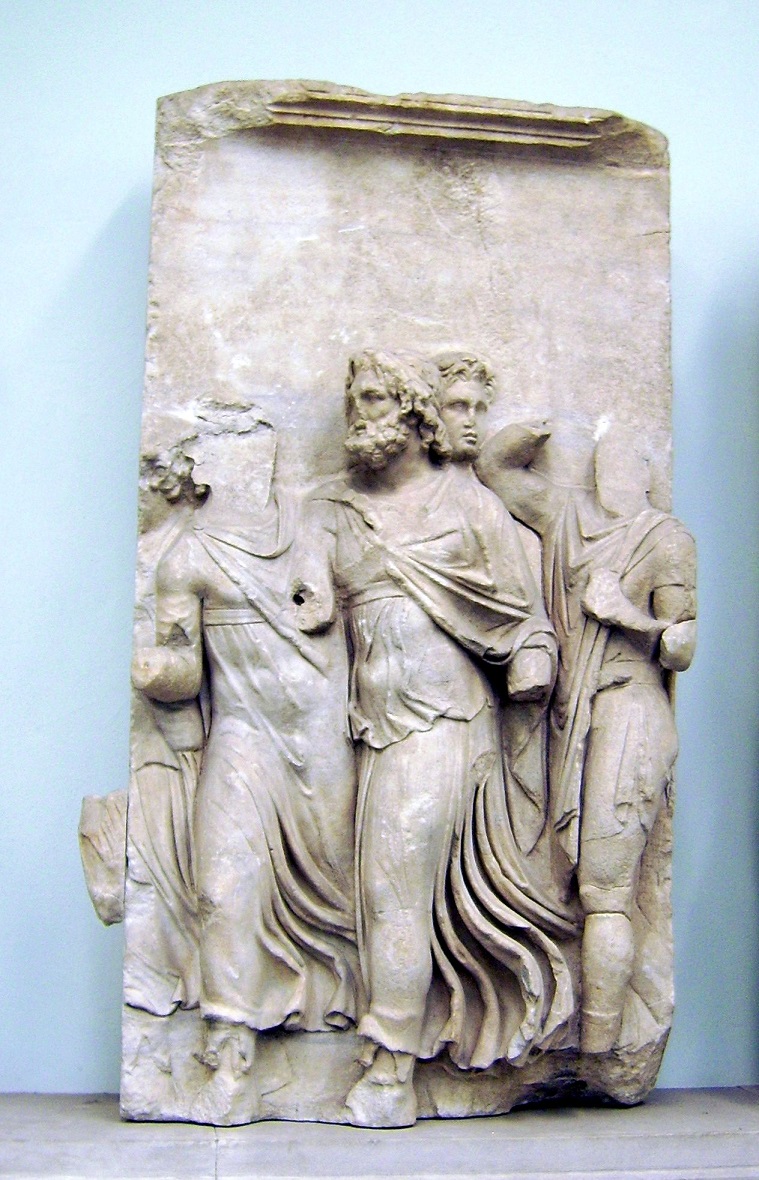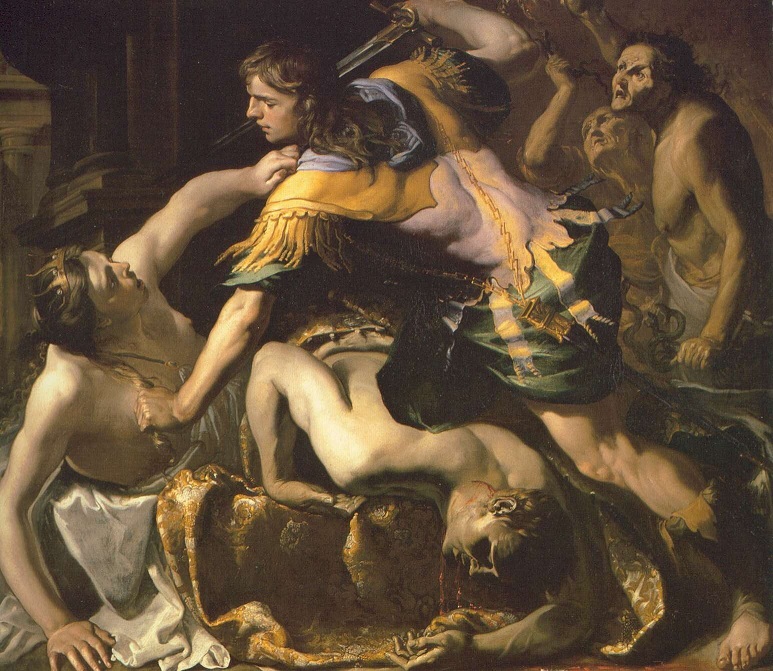Catreus
In Greek mythology, Catreus or Katreus (Ancient Greek: Κατρεύς) was the eldest son of Minos and Pasiphaë, and Minos' successor as king of Crete.
Catreus had one son, Althaemenes, and three daughters, Apemosyne, Aerope and Clymene.
Catreus was mistakenly killed by his son Althaemenes thereby fulfilling an oracle.
Mythology
According to Apollodorus' account, an oracle told Catreus that one of his children would kill him. Although Catreus kept the prophecy secret, his son Althaemenes found out, and fearing that he would be the one to kill his father, took his sister Apemosyne and left Crete for Rhodes.
Catreus gave his other daughters to Nauplius to be sold off in foreign lands, and Aerope married Pleisthenes (or Atreus), but Nauplius kept Clymene for himself as wife. Years later, as an old man Catreus sailed the seas searching for his son, so that he could pass on his kingship to him. His ship stopped at Rhodes and was mistaken by some cowherds for a pirate ship. Catreus tried to explain who he was, but could not be heard above the barking of the cowherds' dogs.
Althaemenes arrived and killed his father with his javelin, thus fulfilling the prophecy. When Althaemenes realized what he had done, Althaemenes prayed and was swallowed up by a chasm in the ground.
Diodorus Siculus, gives a slightly different version of the story, saying that an oracle had been given to Althaemenes which said that he was destined to kill his father. Another tradition involving Catreus' daughter Aerope, followed by Euripides in his lost play Kressai, and possibly by Sophocles in his play Ajax, was that Catreus found Aerope in bed with a slave and sent her to Nauplius to be drowned.
Catreus, an ancient Cretan city mentioned by the second-century Greek geographer Pausanias, was apparently supposed by the Cretans to have been founded by Catreus. According to Apollodorus, Catreus' grandson Menelaus (Aerope's son) was away in Crete, presiding at Catreus' funeral, when Paris took Helen to Troy.
The story of Catreus shares similarities with stories told about Aleus, king of Tegea. In these stories, Aleus received an oracle that his grandson would kill Aleus' sons, so Aleus took measures to keep his daughter Auge a virgin, nevertheless Auge became pregnant (by Heracles) and Aleus (as did Catreus) gives his daughter to Nauplius, to be drowned but instead Nauplius sold her to the Mysian king Tethras, who adopts her son Telephus, as his heir. As an adult Telephus returns to Tegea and unknowingly kills his uncles.
The Funeral: the Spark that ignited the Trojan War
Arguably the most important aspect of King Catreus’ role in Greek mythology comes after his death, for the body of the deceased king was returned to Crete for funeral rites and games.
Important people attended Crete from across the ancient world, but of note was the presence of Menelaus on the island. As a male member of the line of Catreus, being the son of Aerope, it was of course expected that Menelaus be present. This though meant being away from his kingdom of Sparta, at a time when the Trojan prince Paris was visiting.
Paris would of course take advantage of the king’s absence to abduct Helen, and sail away with the king’s wife and a large amount of Spartan treasure, an act that bring forth the Trojan War.

Sources
Hard, pp. 354–355; Grimal, s.v. Catreus, p. 92
Tripp, s.v. Catreus, p. 152
Smith, s.v. Creteus
Apollodorus, 3.2.1
Diodorus Siculus, 4.60.4, 5.59.1–4
Pausanias, 8.53.4
Apollodorus, 3.2
Apollodorus, E.2.10, E.3.12.
Diodorus Siculus, 4.60.4.
Hard, p. 355; Gantz, p. 271. Euripides' treatment of the story is according to the scholiast on Sophocles, Ajax 1297, citing Euripides' Cretan Women, see: Collard and Cropp, pp. 520, 521; Webster, pp. 37–38; Jebb's note to Ajax 1295 Κρήσσης.
Gantz, pp. 554–555; Jebb's note to Ajax 1296 ὁ φιτύσας πατήρ.
Pausanias, 8.53.4, which also says that according to the Tegeans, Catreus, along with Cydonia and Gortyna, had instead been founded by three sons of Tegeates, Cydon, Archedius, and Gortys, who had migrated to Crete from Arcadia.
Tripp, s.v. Catreus, p. 152; Apollodorus, E.3.3.
Alcidamas, Odysseus 14-16 (Garagin and Woodruff, p. 286)
Apollodorus, 2.7.4, 3.9.1
Diodorus Siculus, 4.33.7–12
Pausanias, 8.48.7.
"Wikipedia"













